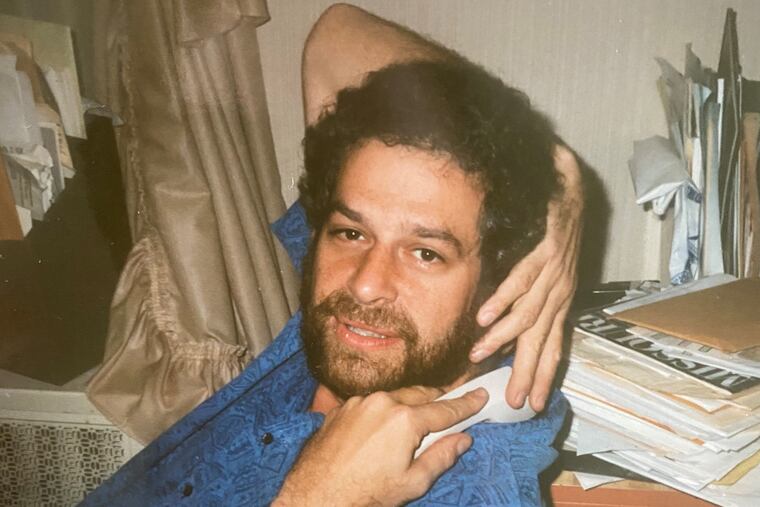Stephen Honeyman, influential Philadelphia and Camden community activist, dies at 69
He had college degrees in political science, English literature, and journalism. But helping the power-deprived, disenfranchised, and underrepresented was his life’s work.

Stephen Honeyman, 69, of Jenkintown, a longtime influential community activist in Philadelphia, Camden, and elsewhere, died Monday, Sept. 20, of an infection that resulted from long-term diabetes at Wesley Enhanced Living at Stapeley in Philadelphia.
Inspired by Saul Alinsky, a well-known Chicago-based community activist who died in 1972, and others, Mr. Honeyman founded and worked with many groups that sought to make life better for people dealing with poverty, housing issues, the opioid crisis, and other critical social problems.
He was a listener, problem solver, and prolific manager who preferred to empower others over acquiring power himself. “His role was to assist people in finding their communal voice, and exercising it to improve their community,” his family wrote in a tribute.
Mr. Honeyman had a bachelor’s degree in political science and English literature from Temple University and a master’s degree in journalism from the University of Missouri. But “helping the power-deprived, underrepresented, and disenfranchised was his life’s work,” his family said.
He helped found Camden Churches Organized for People (CCOP) in 1985 and was founder and director of the Eastern Pennsylvania Organizing Project (EPOP) in 1993. He also worked for the Chicago-based National Training and Information Center, the Philadelphia-based Eastern Communities Training Institute, and founded his own organizing and management company, In the Public Interest.
Mr. Honeyman’s son, Devon, said his father “just cared for people. It didn’t matter who they were. He befriended people who needed help.”
At CCOP, Mr. Honeyman worked to curb violence in Camden, revitalize the city’s economy, and improve health care. At EPOP, he did the same for struggling Philadelphia neighborhoods, Kensington in particular.
“To know Steve,” said his brother, former Philadelphia immigration Judge Charles Honeyman, “was to be challenged by him.”
Born April 30, 1952, in Philadelphia, Mr. Honeyman graduated from Haverford High School in 1970. While attending the University of Missouri in the 1970s, he got involved with Investigative Reporters and Editors Inc., a grassroots nonprofit that works to improve investigative reporting, and his skill at community organizing blossomed.
Later, at the National Training and Information Center, he helped speed community reinvestment across the country, and make home loans more accessible to low-income buyers, among other projects. With noted community activist Kathleen O’Toole and her Eastern Communities Training Institute, he helped Philadelphia, Camden, and Wilmington religious congregations organize community programs and activities.
In 1990, Mr. Honeyman formed In the Public Interest to consolidate his activities, and worked with the Philadelphia Parks and Recreation Department, the Point Breeze Performing Arts Center, Witness to Innocence, the Pennsylvania State Police, and others.
He also worked for the campaigns of Philadelphia politicians Louis Hill, Michael Nutter, Danilo Burgos, and Maria D. Quiñones-Sánchez.
He was involved in the 1980s and ’90s with families who fled to Philadelphia to avoid violence in Central America. In the 2000s, he helped the Nick Virgilio Haiku Association found a writers’ house in South Camden.
“We think of him as a Johnny Appleseed, planting seeds of ideas and strategies here and there, instigating all kinds of efforts,” his family wrote in the tribute.
Mr. Honeyman liked to sing and dance, neither of which he did very well, his family liked to say. He played basketball and ping-pong. He was a fan of the Grateful Dead, followed the local sports teams, and collected wall pockets and blue glass.
He enthralled his children and grandchildren by dressing up as Zorro, the fictional masked vigilante who defended the oppressed in California in the 1800s, and filled his home with plants.
Mr. Honeyman married Eileen Kernick in 1988, and they had two children. They divorced in 2005 but remained close.
Even as his health declined, Mr. Honeyman retained the vitality and curiosity that defined his life. Asked by family members if he feared death, Mr. Honeyman replied: “No. I’m intrigued.”
In addition to his son, brother, and former wife, Mr. Honeyman is survived by his daughter, Melanie; stepson, Sean Kernick; two grandchildren; a brother; and other relatives.
A service is scheduled for 11 a.m., Saturday, Nov. 6, at Holman Field, behind the Germantown Mennonite Church, 58 W. Pomona St., Philadelphia, Pa. 19144.